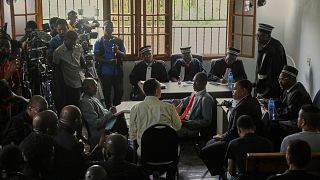Haiti
The U.S. Department of Homeland Security (DHS) on Monday said it will allow more than 50,000 victims of Haiti’s 2010 earthquakes to remain in the United States with work authorizations until January 2018.
Three DHS officials said Homeland Security Secretary John Kelly has assessed the situation in Haiti and believes conditions there are improving but still necessitate protected status for Haitians living in the U S.
New York City’s Flatbush neighborhood is home to a sizable Haitian community where Caribbean businesses dot the area. Inside, Radio Soleil, which calls itself the voice of the Haitian community, station manager Ricot Dupuy hears the concerns of Haitians living and working in New York.
Dupuy said Haitian families have been living in fear since the Miami Herald published an internal memo the last month from the U.S. Citizenship and Immigration Services, part of DHS, that recommended an end to Haiti’s TPS designation.
“It’s a near panic situation. In all the Haitian families, that is what’s being discussed on the top of the agenda. It’s disbelief. They don’t think they would ever come to that point. TPS (Temporary Protected Status) has been renewed three times and they kind of expected it to happen, simply because the reasons that caused TPS to be granted are essentially the same and to some degree have worsened,” Dupuy said.
He added that Haitians feel proud to live and work legally in the U.S. “They see the TPS as legalizing their status here. And all of a sudden, there is that threat of reverting to the situation in Haiti.”
U.S. law allows DHS to grant temporary protected status to citizens of countries ravaged by violence, disease and natural disasters.
A representative from Human Rights Watch in Haiti, Anthonal Mortime said Seven years after the 2010 earthquake, Haiti doesn’t have any plan for social accommodations, nor a plan to rebuild public buildings, accommodations where a family can live.
“As a Haitian, I am optimistic, hoping that he [President Trump] will reinstate the TPS. If not, it could create a lot of problems, like a humanitarian catastrophe if those Haitians returning to the country don’t have any place to live, nothing to eat,” she said.
As of 2015, 79,000 people were still living in Port-au-Prince’s tent camps. The squalid conditions were compounded last October when Hurricane Matthew slammed into the island nation.
In a tent camp near the neighborhood of Petion-Ville, Clermentha has lived in a wooden and aluminum shack for the past seven years.
“The Haitian state hasn’t done anything for us. Each day, the officials pass through here. They look at us. They see us. Sometimes the children are naked on the streets, under the dirty tents.They look at the kids; they take their pictures but they don’t tell us anything,” she added.
The Department of Homeland Security will issue a notice to the Federal Register to extend temporary protected status within the coming days.
After a 60-day period, Haitians under the status will be given new work authorizations valid until January.













01:52
UN's crucial humanitarian aid work faces a clouded future amid cuts in funds
02:00
Refugees in Kenyan camp face hunger after USAID funding freeze
Go to video
A decade on, Lesbos still bears the scars of the refugee crisis
01:37
Sudan faces rapidly-spreading cholera outbreak, 1000 daily cases in capital
01:11
'Devastating milestone': More than 4 million people have fled Sudan since start of civil war
01:12
Cameroon tops list of world's most neglected displacement crises